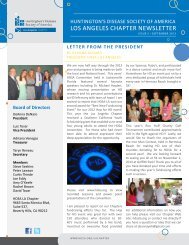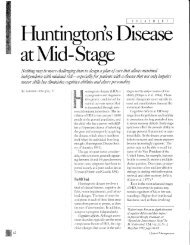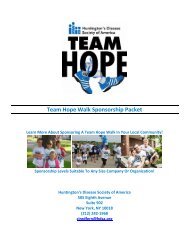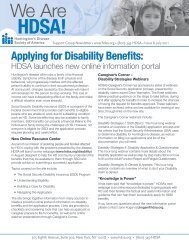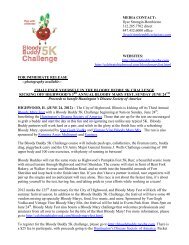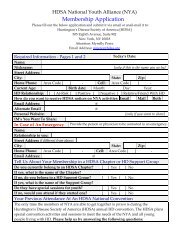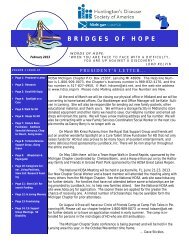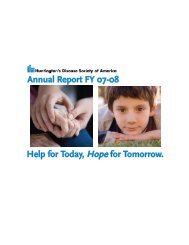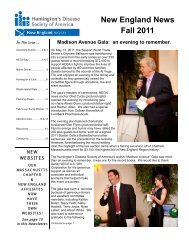Understanding Behavior in HD.final.8-18-05 - Huntington's Disease ...
Understanding Behavior in HD.final.8-18-05 - Huntington's Disease ...
Understanding Behavior in HD.final.8-18-05 - Huntington's Disease ...
You also want an ePaper? Increase the reach of your titles
YUMPU automatically turns print PDFs into web optimized ePapers that Google loves.
9<br />
Stage I: (0–8 years from illness onset) Ma<strong>in</strong>ta<strong>in</strong>s only marg<strong>in</strong>al engagement <strong>in</strong> occupation hav<strong>in</strong>g part-time<br />
voluntary or salaried employment potential, and ma<strong>in</strong>ta<strong>in</strong>s typical pre-disease levels of <strong>in</strong>dependence <strong>in</strong> all<br />
other basic functions, such as f<strong>in</strong>ancial management, domestic responsibilities, and activities of daily liv<strong>in</strong>g<br />
(eat<strong>in</strong>g, dress<strong>in</strong>g, bath<strong>in</strong>g, etc.); or performs satisfactorily <strong>in</strong> typical salaried employment (perhaps at a lower<br />
level) and requires slight assistance <strong>in</strong> only one basic function: f<strong>in</strong>ances, domestic chores, or activities of daily<br />
liv<strong>in</strong>g.<br />
Stage II: (3–13 years from illness onset) Typically unable to work but requires only slight assistance <strong>in</strong> all<br />
basic functions: f<strong>in</strong>ances, domestic, daily activities; or unable to work and requires major assistance <strong>in</strong> one basic<br />
function with only slight assistance needed <strong>in</strong> one other; at least one basic function is handled <strong>in</strong>dependently.<br />
Stage III: (5–16 years from illness onset) Totally unable to engage <strong>in</strong> employment and requires major<br />
assistance <strong>in</strong> most basic functions: f<strong>in</strong>ancial affairs, domestic responsibilities, and activities of daily liv<strong>in</strong>g.<br />
Stage IV: (9–21 years from illness onset) Requires major assistance <strong>in</strong> f<strong>in</strong>ancial affairs, domestic<br />
responsibilities, and most activities of daily liv<strong>in</strong>g. For <strong>in</strong>stance, comprehension of the nature and purpose of<br />
procedures may be <strong>in</strong>tact, but major assistance is required to act on them. Care may be provided at home but<br />
needs may be better provided for at an extended care facility.<br />
Stage V: (11–26 years from illness onset) Requires major assistance <strong>in</strong> f<strong>in</strong>ancial affairs, domestic<br />
responsibilities, and all activities of daily liv<strong>in</strong>g. Full-time skilled nurs<strong>in</strong>g care is required.<br />
These stages are very broad guidel<strong>in</strong>es and <strong>in</strong>dividuals can vary a great deal <strong>in</strong> the course of the illness.<br />
For <strong>in</strong>stance, one patient has had chorea for 15 years yet he is still employed (<strong>in</strong> a reduced capacity) at his<br />
regular job.<br />
Angry at Albert … And <strong>HD</strong><br />
“At first I thought it was just his imag<strong>in</strong>ation. He compla<strong>in</strong>ed that he wasn’t able to<br />
work as effectively as he used to. When he “quit” his job of 20 years I was concerned,<br />
but he assured me that his new job was a “good opportunity.” Only after los<strong>in</strong>g<br />
this job, too, did I realize that my high-level executive husband was no longer<br />
able to function <strong>in</strong> his regular capacity. He tried several jobs over the next few years<br />
—just to keep busy and to keep money com<strong>in</strong>g <strong>in</strong>. F<strong>in</strong>ally, he became too frustrated<br />
to perform the way he wanted. I decided that he could take care of the kids and the<br />
house if he was go<strong>in</strong>g to stay home. He stayed home but was constantly pac<strong>in</strong>g the<br />
house and became agitated at the drop of a hat. There was too little money and the<br />
home front was fall<strong>in</strong>g apart. I was angry with him for los<strong>in</strong>g jobs and not help<strong>in</strong>g me<br />
out at home. He just didn’t look that sick, so I couldn’t figure out why he was be<strong>in</strong>g<br />
so impossible. I wanted Albert to make money, be a parent, and be a husband for<br />
me. I was angry that all of this was gone. We went through five miserable years<br />
before I could beg<strong>in</strong> to accept that <strong>HD</strong> was part of our family. I yelled a lot and I<br />
cried a lot. Even now, just when I start to figure th<strong>in</strong>gs out, everyth<strong>in</strong>g changes and I<br />
have to start over. It’s a long process of accept<strong>in</strong>g and cop<strong>in</strong>g, over and over aga<strong>in</strong>.”



